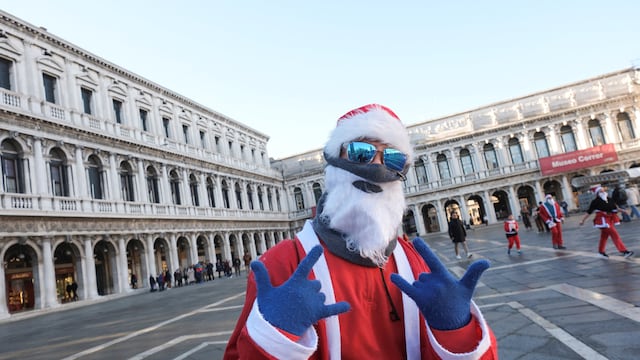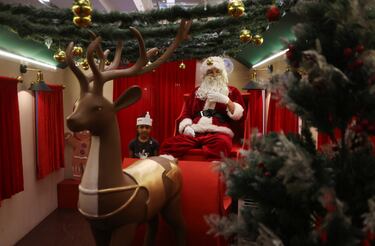Sinterklaas, Santa-Kurosu, Santi Clo, Colacho, Djed Mraz, El Viejito Pascuero... who is Santa Claus to you?

What is Santa called in other countries?
While Christmas isn’t celebrated in many parts of the world (China, many Middle Eastern and Asian countries for example generally don’t), most people will at least be familiar with the figure of Santa Claus, who is also known as Father Christmas, Saint Nicholas…
Even in the western world where Christianity is far more prevalent, Christmas is celebrated differently in different countries, traditions vary and Santa goes by a variety of different names. So while in Great Britain, the jolly, rotund old man with rosy cheeks, a long white beard wearing a red and white suit is known as Father Christmas but over in Costa Rica, they know him as Colacho. But while Santa goes under different guises, his vocation is the same wherever he is - a gift giver, a personification of Christmas and generosity.

Saint Nicholas, Father Christmas
In England, the idea of Father Christmas is linked to the Church and dates back centuries - to the 15th Century at least if not earlier. However it wasn’t until the late 19th Century that Father Christmas and the mythical figure of Santa Claus, popular in North America and Canada, became synonymous - both are based on Saint Nicholas.
The figure of Father Christmas/Santa Claus derives from Saint Nicholas of Myra, or Nicholas of Bari, a Greek-born bishop during the time of the Roman Empire who was renowned for being a secret gift giver - one folktale describes him leaving gold for underprivileged children. Long after his death in 343 AD, many western countries celebrated the Feast of Saint Nicholas - traditionally on 6 December, the day of his passing. Until relatively recently, Father Christmas was a symbolic figure rather than the mythical being he is portrayed as in modern times.
What’s yours.. I can’t decide!! Maybe A3D HoHoHo! 🎅 pic.twitter.com/OvHE3g0sR9
— Santa Claus (@OfficialSanta) November 24, 2023
During the 16th Century Reformation, when many countries broke away from Roman religious rule, the date of the Feast of Saint Nicholas was moved to the 24th and 25th of December. The mythical figure of Santa Claus, Sinterklaas or Father Christmas as we know him today, visits households on Christmas Eve (24 December), leaving gifts for children who have behaved well.
Related stories
There are several theories about how Santa Claus emerged in North America - the most popular, and feasible, being that the tradition was imported by Dutch immigrants who had settled in an area which would later become New York sometime in the late 18th Century..
Santa is known by different names in different countries, most are derivatives from Saint Nicholas (San Nicolás, San Nicola, São Nicolau… etc). Even in countries where Christmas is not universally celebrated, he is pretty much known by everyone - for example in Japan, where Christmas is not a recognised holiday, he is called Santa-Kurosu or just Santa-san. In Chile, he is simply El Viejito Pascuero, The Old Man while in parts of eastern Europe his name translates as Father Frost.
Santa's cabin in Lapland. Soon it's Christmas 🎄
— Visit Lapland (@OurLapland) December 20, 2022
📷 Miina Karoliina | visitlapland |IG #Finland #December2022 #VisitLapland pic.twitter.com/c5cjFQdCZa
How is Santa Claus known around the world?
- Argentina - Papá Noel
- Balkans - Shen’Kollë
- Belgium - Sinterklaas, de Sint
- Brazil - Papai Noel, Pai Natal, São Nicolau, Kris Kringle
- Chile - El Viejito Pascuero, El Viejo Pascuero
- Colombia - Papá Noel
- Costa Rica - Colacho
- Croatia - Djed Mraz
- Cuba - Santa Claus, Santa Clos, Santi Clo
- El Salvador - Santa Claus, Santa Clos, Santi Clo
- France - Père Noël, Saint-Nicolas
- Germany - Weihnachtsmann
- Guatemala - Santa Claus, Santa Clos, Santi Clo
- Hong Kong - Father Christmas, Santa, Santa Claus (Cantonese: Sing Daan Lou Yan)
- Italy - Babbo Natale, San Nicola
- Japan - Santa-Kurosu, Santa-san
- The Netherlands - Sinterklaas
- Nicaragua - Santa Claus, Santa Clos, Santi Clo
- Poland - Swiety Mikolaj
- Portugal - São Nicolau
- Puerto Rico - Santa Claus, Santa Clos, Santi Clo
- Russia - Ded Moroz
- Spain - Papá Noel
- Turkey - Noel Baba
- Ukraine - Svyatyy Mykolay, Did Moroz
- United Kingdom - Father Christmas, Santa, Santa Claus
- United States - Santa Claus, Kris Kringle
- Venezuela - San Nicolás


Complete your personal details to comment